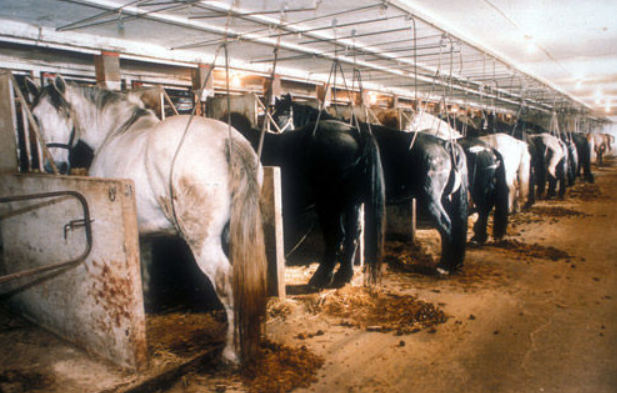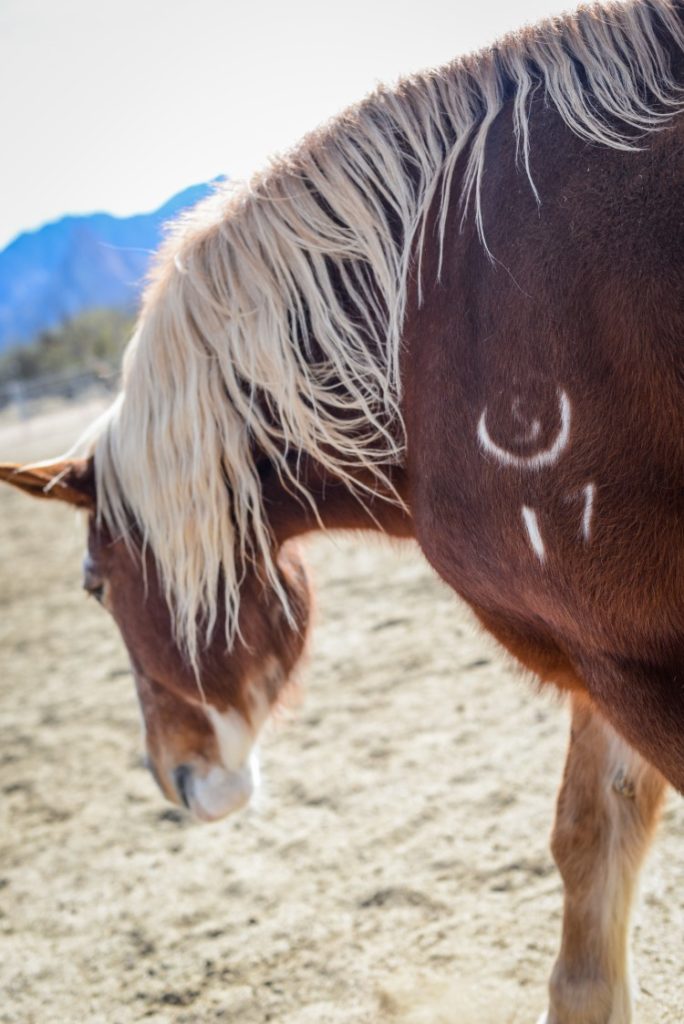Premarin and Premarin-containing products are Hormone Replacement Therapy (HRT) drugs manufactured by Wyeth Pharmaceuticals (part of Pfizer since January 2009). These drugs use the estrogen from pregnant mare’s urine. Premarin, which stands for Pregnant Mare’s Urine (PMU), is prescribed to reduce the symptoms of menopause, and is available in several forms including pills, creams, injections and patches. There are numerous plant-based and synthetic alternatives to Premarin that work equally as effectively, are far safer, and don’t cause pain, suffering and death to horses.
To make Premarin from mare’s urine, Pfizer contracts with PMU (Pregnant Mare’s Urine) horse farms. Most farms are now located outside of the United States in order to escape regulation and controversy. In recent years, the industry has expanded to China, where there are reportedly 90,000 mares currently on PMU farms.

At their peak in the U.S. and Canada, industrial PMU farms produced an unbelievable 40,000 foals per year, the majority of whom were trucked away after birth or at a young age and sold to “kill buyers” for transport to slaughterhouses for meat. These foals are one of the tragic consequences of the manufacture of these drugs. Some foals—the lucky ones—are sold to horse owners and horse rescue organizations. In 2002 alone, nearly 15,000 foals were sold directly to the slaughter industry. As horse slaughter isn’t legal in the United States, these animals are transported internationally to be killed, typically in Canada or Mexico.
One PMU industry insider says, “See, the foals—and the mares which [sic]can’t get pregnant any more—they are the by-product of the PMU industry. We crush ’em and recycle ’em, just like [aluminum]cans.”
These horses suffer immensely for the production of this drug and they receive virtually no legal protection. Animal cruelty laws and government regulations do not apply to the treatment of mares and foals on Premarin farms.

Life is cruel and uncomfortable for PMU mares. They are forcibly impregnated over and over again to continually produce high levels of estrogen for Premarin products. Their pregnancies last for 11 months, then they are impregnated again after giving birth – a relentless and physically exhausting cycle.
Newborn foals are taken away from their mothers, and most are fattened and then sent to slaughterhouses in other countries and killed for meat. Their meat is shipped to Japan, France and elsewhere in Europe for human consumption. The mares never get the chance to bond with their offspring, they are treated solely as profit-making machines. Not only are they deprived of relationships with their young, these highly social herd animals are deprived of any meaningful social interaction with other horses.
Premarin mares are not allowed to move, walk or run. Their movement is completely restricted. They are never allowed to express any of their normal and natural behaviors, like grazing on grass or frolicking in a pasture, because they are attached 24/7 to a urine collection device. The mares must stand upright all the time, and are confined in tight, narrow stalls. They are not even allowed to turn around or lie down.
Mares are intentionally dehydrated by being deprived of fresh water in order to concentrate their urine, making it more profitable for Pfizer. In addition to routine dehydration, there are many medical issues common to Premarin mares, including serious reproductive system issues due to such frequent breeding and pregnancy. They seldom receive the veterinary and medical care they need.
There are over a dozen synthetic and plant-based estrogens that have been approved by the FDA over the years, and act in a very similar way to Premarin. Many are considered equally effective. Medical research has also shown serious and potentially fatal human health risks and dangers associated with taking the Premarin family of drugs for hormone replacement therapy (HRT).

How You Can Help
- Don’t take the Premarin family of drugs or DUAVEE. Instead, ask your doctor to prescribe a synthetic or plant-based alternative.
- Speak up! Call and write the Chairman/CEO of Pfizer, Albert Bourla, and demand Pfizer cease Premarin production and produce a synthetic and humane product.
- Dr. Albert Bourla, Executive Chairman of the Board/CEO – Pfizer, Inc., 235 East 42nd Street, New York, NY 10017, USA. Phone: 212-733-2323.
- Write a letter to your local newspaper about the cruelty of Premarin production, and the safe alternatives available.
- Support horse rescue nonprofits that rescue foals and mares from PMU farms.
- Warn others about these animal-based drugs and educate them about the suffering inherent in Premarin production. Share about this issue on social media.
This article was originally published on the Humane Decisions website.
Featured image: close-up of a rescued mare from the PMU industry at Equine Voices Rescue and Sanctuary. Image credit Jo-Anne McArthur / We Animals.





